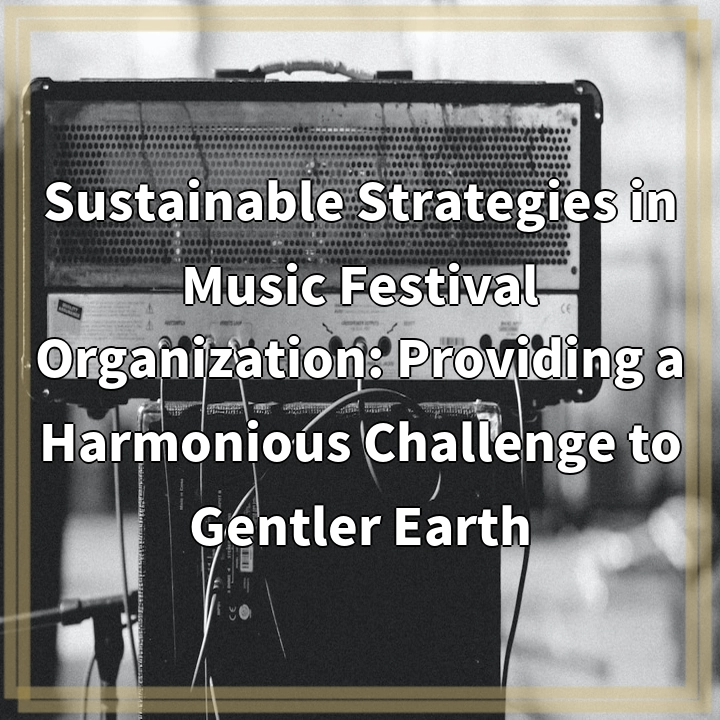
What it is:
Music festivals have become increasingly popular over the years, drawing in large crowds and creating memorable experiences for attendees. However, the environmental impact of these events is undeniable, leading to a greater need for sustainable strategies in music festival organization. These strategies aim to minimize the negative consequences on the planet while still providing an enjoyable experience for festival-goers.
Real-World Problems:
1. Waste Management:
One of the most significant challenges faced by music festivals is waste management. With thousands of attendees, a considerable amount of trash is generated, including food waste, plastic bottles, and other single-use items. The proper disposal and recycling of this waste can be a daunting task for festival organizers, particularly in open-air venues. Finding effective waste management solutions that minimize the environmental impact is crucial.
2. Energy Consumption:
Music festivals require a significant amount of energy to power sound systems, lighting, stages, and other equipment. This energy consumption often relies heavily on fossil fuels, contributing to carbon emissions and climate change. Developing and implementing sustainable energy solutions, such as utilizing renewable energy sources like solar panels or biofuels, can greatly reduce the environmental impact of music festivals.
3. Water Usage:
Water is another valuable resource often mismanaged during music festivals. Providing water for attendees and sanitation purposes can lead to excessive water consumption, especially in regions already prone to water scarcity. Implementing water conservation measures, such as installing water-efficient fixtures, promoting reusable water bottles, and offering water refill stations, can help reduce water usage and minimize the festival’s overall water footprint.
4. Noise Pollution and Wildlife Disturbance:
Music festivals are typically characterized by loud music and large crowds, leading to increased noise pollution in the surrounding areas. This can negatively impact local wildlife by causing stress and disturbance. Minimizing noise pollution through better soundproofing techniques and incorporating wildlife-friendly practices can help mitigate this issue and maintain a harmonious balance between festival activities and the natural environment.
5. Transportation and Traffic Congestion:
Large music festivals often attract attendees from different regions, resulting in increased transportation demands and subsequent traffic congestion. The use of personal vehicles contributes to carbon emissions and pollution. Encouraging alternative transportation options, such as public transportation, carpooling, or providing shuttle services, can help reduce the environmental impact associated with transportation and alleviate traffic congestion around the festival grounds.

Solutions for Sustainable Music Festival Organization:
Implementing sustainable strategies in music festival organization can effectively address the environmental challenges mentioned above. By adopting the following solutions, music festivals can provide a harmonious experience while minimizing their ecological impact.
1. Waste Management:
– Promoting recycling and providing clearly labeled recycling stations throughout the festival grounds.
– Encouraging the use of reusable food containers, cups, and utensils to reduce single-use waste.
– Implementing composting programs for food waste and biodegradable materials.
2. Energy Consumption:
– Adopting renewable energy sources such as solar panels, wind turbines, or bioenergy for powering stages and equipment.
– Utilizing energy-efficient lighting and sound systems.
– Implementing energy monitoring systems and setting energy reduction targets.
3. Water Usage:
– Installing water-efficient fixtures and promoting water conservation measures.
– Offering reusable water bottles and water refill stations to reduce single-use plastic bottles.
– Educating festival-goers about the importance of responsible water usage.
4. Noise Pollution and Wildlife Disturbance:
– Implementing soundproofing measures to minimize noise pollution and disturbance to local wildlife.
– Designating quiet zones around sensitive areas to give wildlife a protected space.
– Incorporating wildlife-friendly practices and working with local conservation organizations to ensure minimal impact on the environment and wildlife habitats.
5. Transportation and Traffic Congestion:
– Encouraging the use of public transportation, carpooling, and shuttle services for festival attendees.
– Providing designated parking areas for carpooling and electric vehicles.
– Partnering with local transportation authorities to enhance public transportation options to the festival.
By implementing these sustainable strategies, music festivals can demonstrate their commitment to environmental stewardship, inspire attendees to adopt sustainable behaviors, and pave the way for a greener and more eco-friendly future for the music industry.















